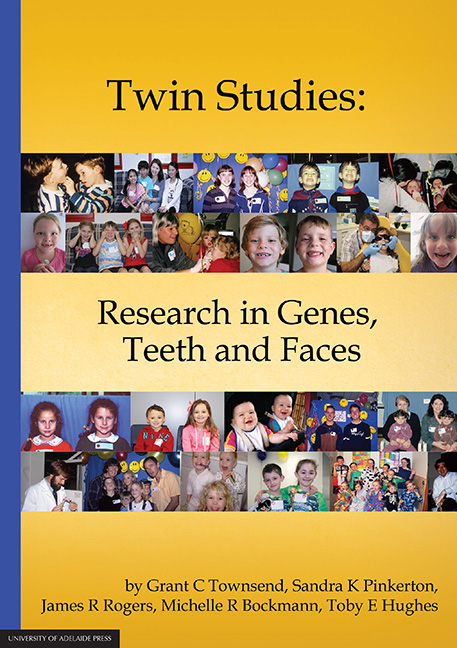Book contents
- Frontmatter
- Foreword
- Preface
- Dedication
- Photographic acknowledgements
- Ethical approval
- Acknowledgements
- Contents
- Chapter One A tour of the mouth
- Chapter Two A historical perspective
- Chapter Three Phases of research involving twin studies of teeth and faces
- Chapter Four Cohort 1: Teeth and faces of South Australian teenage twins
- Chapter Five Cohort 2 – A longitudinal study of dental and facial development in Australian twins and their families
- Chapter Six Cohort 3 – Tooth emergence and oral health in Australian twins and their families
- Chapter Seven Publications and theses relating to the Adelaide Twin Studies
- Glossary of terms
- Appendix 1
Chapter Two - A historical perspective
Published online by Cambridge University Press: 05 February 2016
- Frontmatter
- Foreword
- Preface
- Dedication
- Photographic acknowledgements
- Ethical approval
- Acknowledgements
- Contents
- Chapter One A tour of the mouth
- Chapter Two A historical perspective
- Chapter Three Phases of research involving twin studies of teeth and faces
- Chapter Four Cohort 1: Teeth and faces of South Australian teenage twins
- Chapter Five Cohort 2 – A longitudinal study of dental and facial development in Australian twins and their families
- Chapter Six Cohort 3 – Tooth emergence and oral health in Australian twins and their families
- Chapter Seven Publications and theses relating to the Adelaide Twin Studies
- Glossary of terms
- Appendix 1
Summary
Introduction
The birth of twins has been of interest throughout human history. From the earliest recorded times a multiple birth generated considerable attention both within and outside the family. The fact that these offspring often shared the same physical characteristics led to many explanations about the possible underlying causes. These explanations often related more to the depth of the imagination than to any factual evidence. Without knowing the complexities of the twinning process, early societies had to construct explanations that ordinary people could understand and accept, and it is not surprising that many of these explanations were centred on the mythical aspects of their cultures and religions.
Attitudes toward twins and twinning varied considerably in different parts of the world and could change quite dramatically over time. In pre-industrial societies there appeared to be two distinct attitudes towards them. One linked more to the unexplained (mythological) supernatural aspect and the other to the practicality of living with twins. The lives of twins depended on their cultural acceptance by society. If they were seen as freaks of nature, then some societies would have no compunction in killing them, and this occurred widely throughout history. Reasons for killing twins varied, but most concerned the idea that twin creation went against the laws of nature. One example of this may be seen in the belief that it was ‘animal-like’ for a mother to produce two children at the same time, or that to have given birth to two babies must mean two fathers. Other beliefs likened twinning to the practice of adultery or even the involvement of an evil spirit, which could well have decided the fate of twins (Bryan, 1983).
The practicality of living with twins was also an important factor in determining how they were treated, particularly in nomadic societies where it became almost impossible to breastfeed two babies when food was scarce and the population was continually on the move to find food and water. In contrast, other societies accepted and even welcomed twins if, for example, the chief of a tribe had twins and the tribe then prospered. If the birth of twins coincided with ‘good omens’, then the likelihood of good fortune would normally be associated with them.
- Type
- Chapter
- Information
- Twin StudiesResearch in Genes, Teeth and Faces, pp. 35 - 61Publisher: The University of Adelaide PressPrint publication year: 2015

